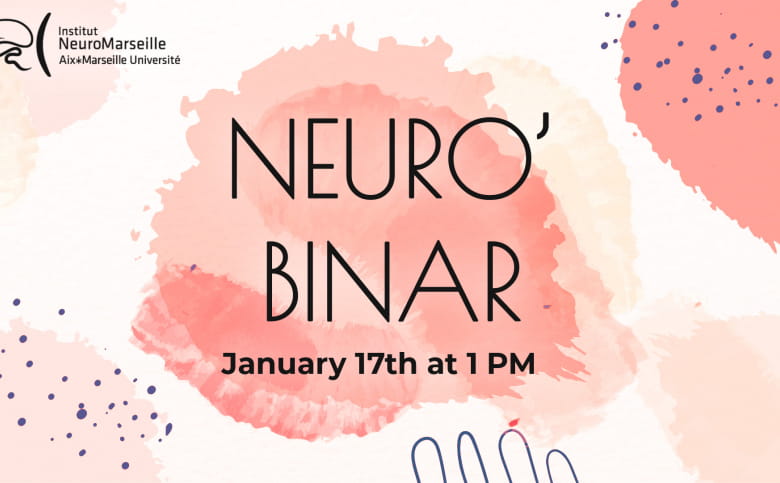
Neurobinar #16 : January 17th at 1pm on Zoom !
For this sixteen Neuro'binar, join us online and discover the work of Antoine De Chevigny (INMED), Alicia Comino García-Muñoz (CRMBM), and Lisa Raoul (LNC). Register on this page to receive the link to the webinar.
Take a break to get to know your colleagues!
On January 17th at 1pm, join us online and discover the work of Antoine De Chevigny (INMED), Alicia Comino García-Muñoz (CRMBM), and Lisa Raoul (LNC). Alicia and Lisa will each present the other’s doctoral project in a cross-presentation. After a question and answer session with the PhD students, Antoine will share with us the progress of his research.
Format
The conference takes place online for one hour. It is composed of two parts: first, two PhD students give a 10-minute cross-presentation, each on the other’s thesis topic. After 5-10 min of questions, they pass the stage to a researcher, postdoc or engineer from the neuroscience community who presents an accessible version of their research in 20 min. Again, a question and answer session follows the presentation, and this is an opportunity to question the researcher, debate the topic of the day and get to know your colleagues better!
Register to receive the Zoom link
The speakers on January 17
Log in and discover the thesis project of Alicia Comino García-Muñoz (CRBM), and Lisa Raoul (CNRS) The presentation of the two PhD students will be followed by the presentation of Antoine De Chevigny (INMED). You will also have the opportunity to ask questions and review the Neurobinar on our YouTube channel.
Learn more about our guests with a summary of their background, bibliography and contact information.
Antoine works at the Institute of Neurobiology of the Mediterranean sea (INMED), where he is PI in the team "Cortical development".
He has studied molecular and cellular underpinnings of adult olfactory neurogenesis in rodents for 14 years, discovering important transcriptional and post-transcriptional mechanisms regulating neural stem cell specification, neuronal migration and terminal differentiation. In 2017, he moved to cortical development in health and neurodevelopment disorders. Antoine has recently developed single cell RNA-seq approaches and neuronal activity imaging in freely-moving mice to interrogate abnormal development and function in rodent models of neurodevelopment disorders.
Alicia graduated in 2016 in Health Biology at the Alcalá de Henares University in Madrid. She worked for two years as a research assistant in the Ramon y Cajal Foundation, and afterwards obtained her Master's Degree in Neuroscience at the Autonomous University of Madrid in 2020.
She came to Marseille in 2020 thanks to a Neuroschool research fellowship and has chosen to start a PhD in 2021 at the CRMBM (Centre de Résonance Magnétique Biologique et Médicale) under the supervision of Angèle Viola and Adriana Perles-Barbacaru.
She is studying the neurological basis of the sequelae observed in patients of cerebral malaria after treatment and recovery, using an animal model of cerebral malaria with survival and MRI and MRS techniques.
Always interested by interdisciplinary approaches, I first studied sport, education and health sciences at Rennes higher normal school. I then enter the world of cognitive neuroscience via Aix Marseille University's Master before starting my PhD at the Cogntitive Neuroscience Laboratory (LNC - AMU).









